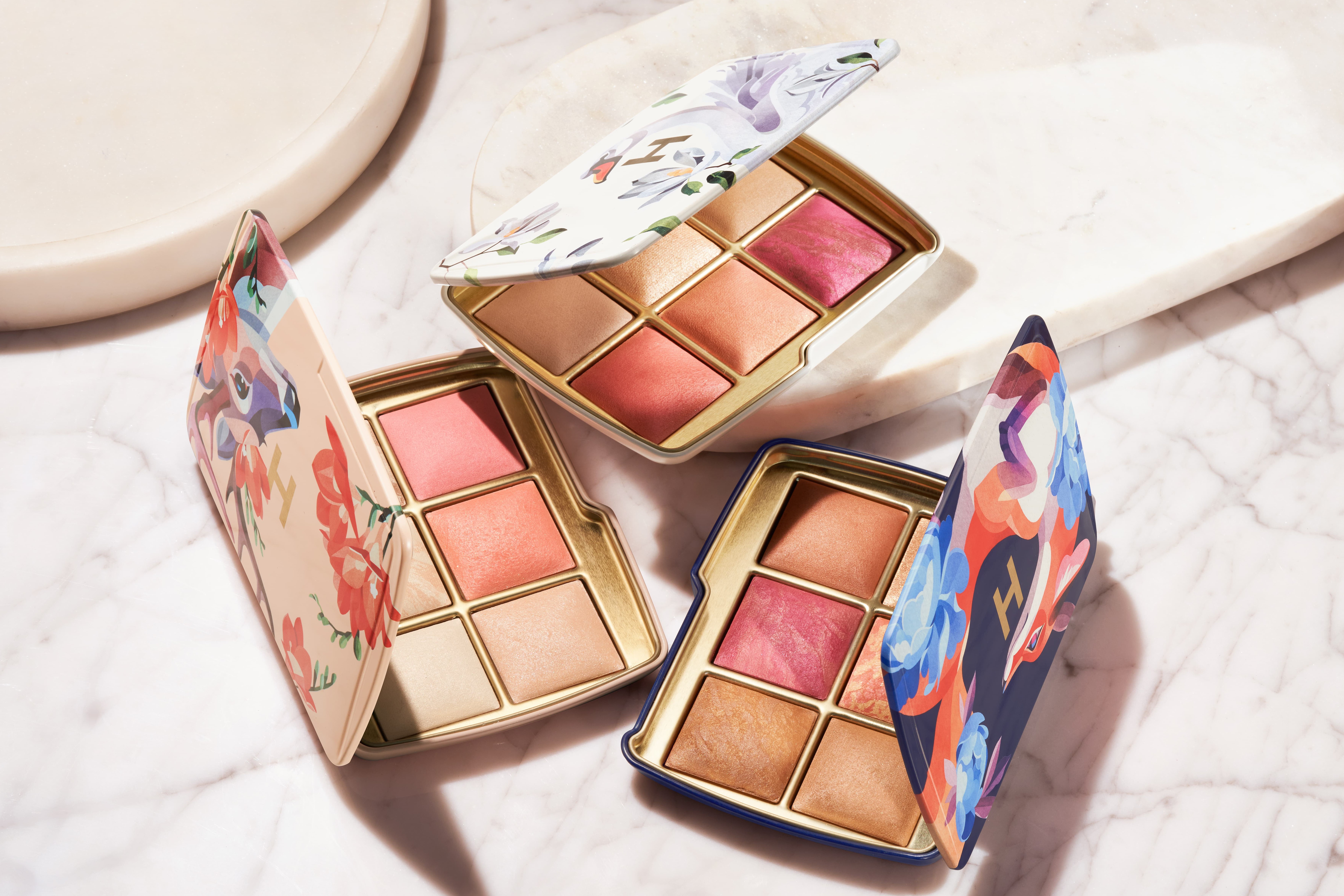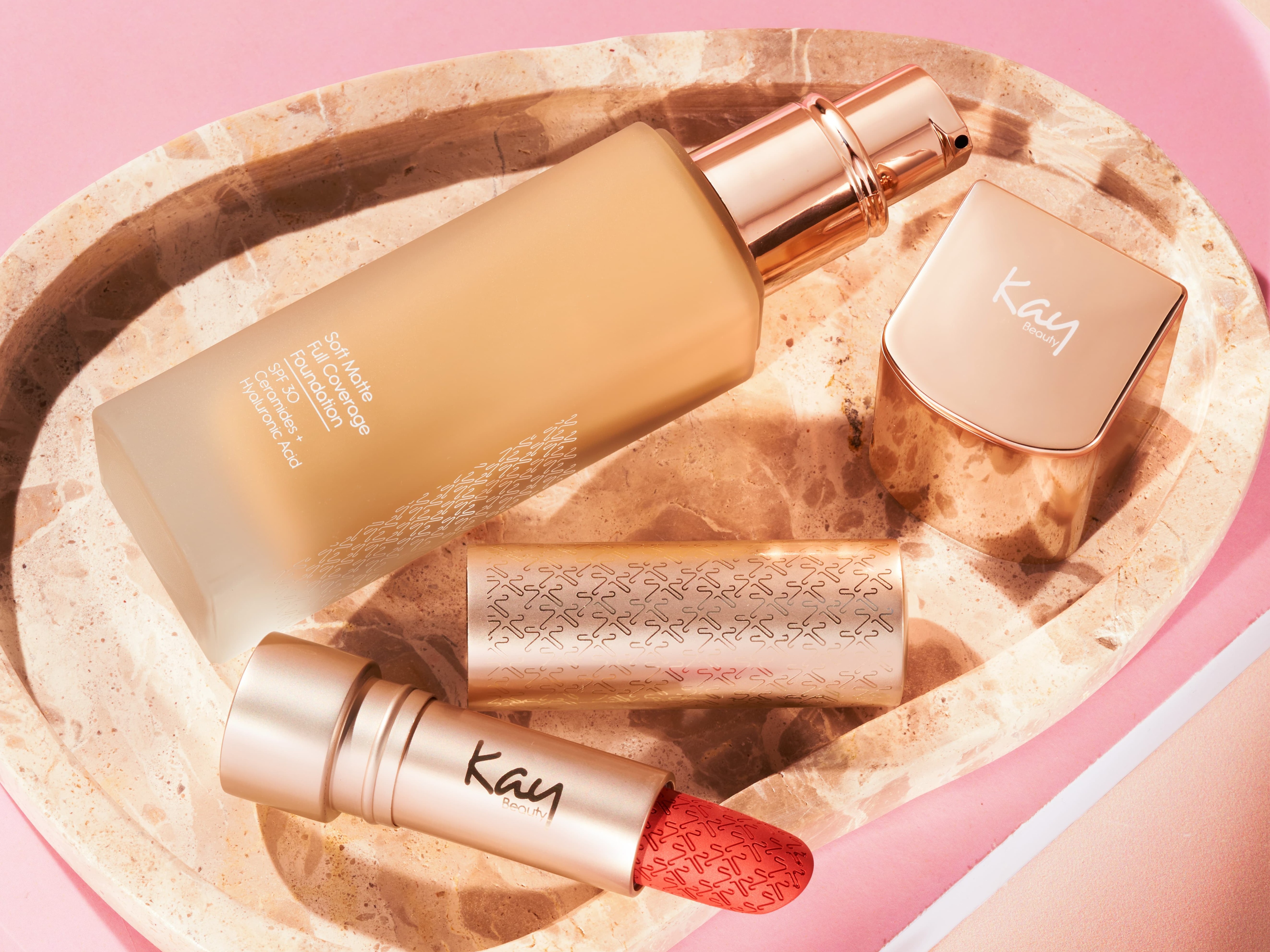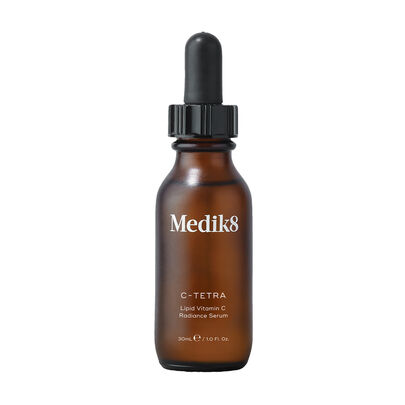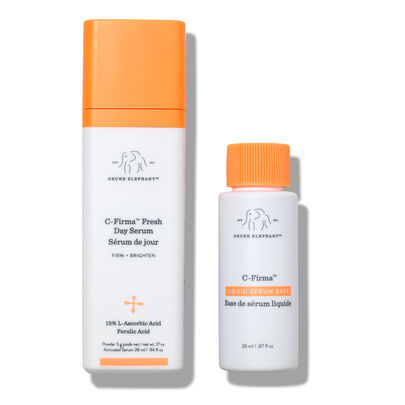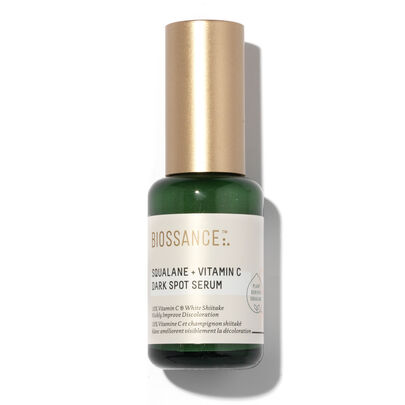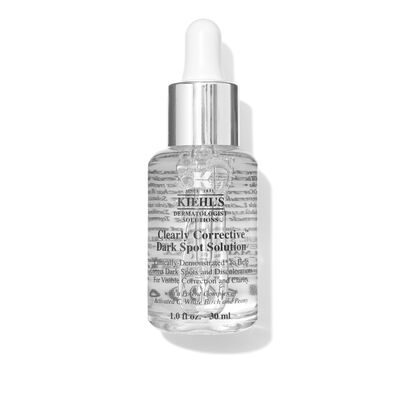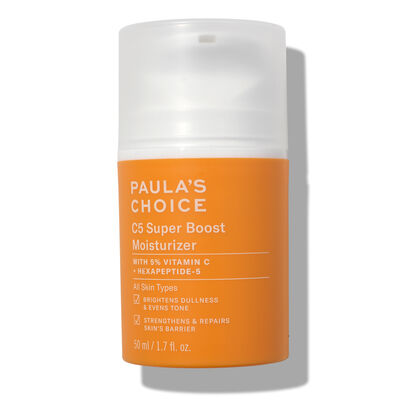How To Add Vitamin C Into Your Skincare Routine
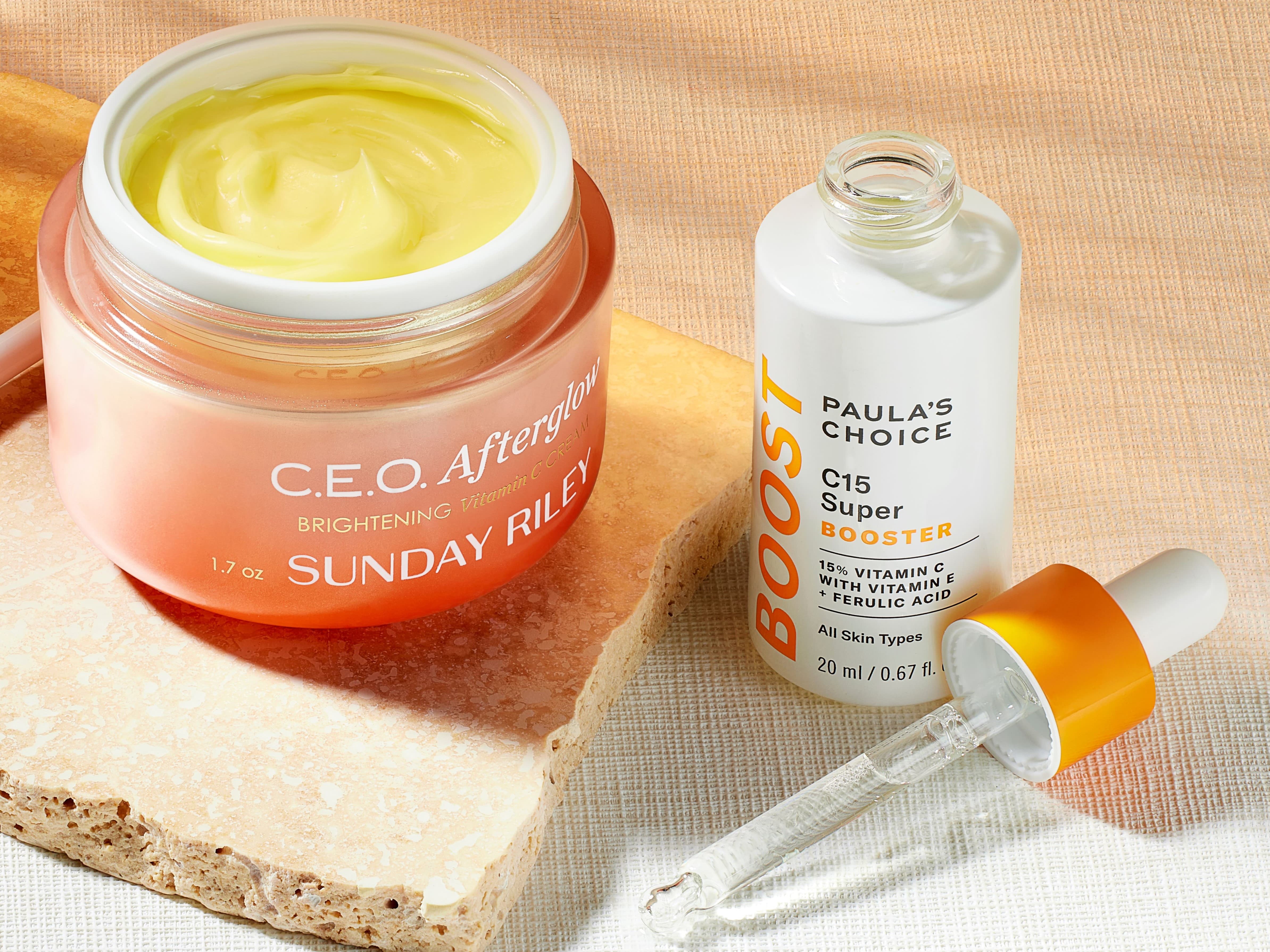
If you’re looking to learn more about this ingredient and how to use vitamin C serum within your skincare routine, you’re in the right place. We’ll also cover questions including the ingredients you can combine with vitamin C and how to store your products.
Why do I need vitamin C in my skincare routine?
We know it’s an ingredient everyone can benefit from, but what does vitamin C do for skin exactly? Vitamin C’s superpower is battling what’s called oxidative stress. “Oxidative stress is a natural part of ageing that can have significant negative effects on your overall health, as well as your skin, and it can occur as a result of UV radiation, smoking, environmental stressors, pollution and a poor diet,” explains aesthetic expert, Dr Christine Hall. “This process damages cells, proteins and DNA resulting in premature skin ageing, loss of collagen, pigmentation and the formation of lines and wrinkles.”
When added to your skincare routine, vitamin C can boost your skin’s defenses against these external aggressors and prevent the oxidative stress from happening in the first place. Of course, wearing a broad-spectrum SPF every day is essential to prevent damage from UV rays, but using vitamin C underneath your sun protection can give the skin a helping hand both with sun damage and other unavoidable environmental factors like pollution.
Vitamin C can also reverse some of the damage that has already been caused by oxidative stress. “Vitamin C can aid your skin’s natural regeneration process and help damaged cells to repair,” says Dr Lubna Khan-Salim. This is why people often use vitamin C for hyperpigmentation and dark spots. The ingredient also addresses inflammation and ageing more generally. “It helps support the skin by speeding up the production of collagen and elastin, the natural protein fibres that are vital for keeping skin firm, plump and healthy,” adds Dr Khan-Salim.
When should I use a Vitamin C serum?
To ensure you reap the most benefits from this antioxidant, it’s crucial to understand how to use your vitamin C serum. Wondering whether you should use your vitamin C in the morning or at night? Well, experts agree that it’s most effective to apply it in the morning.
“As vitamin C is a powerful antioxidant that helps to protect against UV radiation, it is best to apply it in the morning where it will work synergistically with your SPF,” says Dr Hall. “You could use it at night but there is also the risk that it will interact with other night time products such as retinol, which would increase sensitivity,” she adds.
You’re probably also curious whether you should use vitamin C before or after your moisturizer? The jury is out on this. “Vitamin C should always be the first ingredient that is applied in the morning after cleansing your skin,” Dr Hall confirms. Just allow a few minutes for it to soak in before applying other skincare products like your moisturiser and SPF.
If you have been pondering if you can use vitamin C serum every day, the answer is probably yes. Whether or not you need to use your vitamin C product daily will depend on the formulation and strength of the product. “Some vitamin C products can work for a few days on the skin, so it’s important to judge this on a case-by-case basis depending on your individual skin type and the potency of the product you’re using,” says Dr Khan-Salim. “If you start to experience dryness or stinging, try alternating days and see if this alleviates it.”
How long does vitamin C serum take to work?
While quick fixes definitely have their perks, with vitamin C you have to play the long game when it comes to long lasting and noticeable results. Dr Khan-Salim points to two to three months in terms of seeing results from vitamin C on your skin. “This is partly due to the fact that the full regeneration cycle of the skin takes about 28 days,” she says. “However this varies considerably depending on your age as the regeneration cycle increases as we age. It can be almost double this for people aged over 45.”
For a more instant brightening boost, we recommend treating yourself to EverySkin's Vitamin C Boost & Glow facial. The 30-minute treatment includes a potent vitamin C mask followed by LED Light Therapy to ensure you leave with radiant-looking skin. The treatment is available at Space NK Battersea and Duke of York, and you can book here.
What are the different types of vitamin C products?
Vitamin C usually comes as a serum that is applied after your cleanser and before moisturiser. Beyond this, it’s also added to moisturisers, face masks and eye creams. It comes in a number of different forms, but the purest and most stable form is called l-ascorbic acid.
There are a few other types too: ascorbyl glucoside is water soluble and ascorbyl palmitate is oil soluble. Both are less potent than pure vitamin C and therefore great options for sensitive skin types. “Tetrahexyldecyl ascorbate is a newer more potent form of vitamin C which can penetrate more deeply and is faster absorbed into the skin,” says Dr Hall.
How does vitamin C work with other skincare products?
What not to use with vitamin C
Using vitamin C doesn’t mean you can’t use other active ingredients, but we recommend not applying everything at the same time to avoid overloading your skin. As vitamin C is best used in the morning, you can save other active ingredients such as retinol or exfoliating acids like AHAs and BHAs for your evening routine.
If your skin is ever feeling a little over worked, you can always give it a day off and rotate between active ingredients and more soothing ones. Hyaluronic acid, for example works particularly well alongside vitamin C. “Hyaluronic acid has anti-inflammatory and humectant properties, which can help to offset the dryness that can sometimes occur with vitamin C,” Dr Khan-Salim points out.
Can I use vitamin C and retinol together?
These two ingredients are both powerhouses and are beneficial for nearly all skin types but applying them together can cause irritation. This doesn’t mean you need to pick between vitamin C and retinol. “If you wish to incorporate both ingredients into your skincare routine, it’s best to use them at different times of the day,” Dr Khan-Salim recommends.
“The use of a vitamin C in the morning, a retinol at night and an SPF is probably the best anti-ageing routine I could put together, and one that I encourage all my patients to take up,” Dr Hall confirms.
Can I use vitamin C and niacinamide together?
Vitamin C and niacinamide make a great pair and have no issues being used at the same time.
How to store vitamin C skincare
Vitamin C is both a tricky ingredient to formulate and a fussy one to store. This is because it gets degraded and eventually spoiled by both light and air. As a result, vitamin C is packaged in airtight containers made of dark coloured glass.
To ensure your vitamin C product is the most potent: “Be sure to close your product fully after use, keep it open only for as long as needed. If there is a dropper, try not to introduce additional air,” Dr Hall advises. “I also recommend storing your product in a cool and dark place.”
Our final thoughts on adding vitamin C to your skincare routine
Whether you’re after more radiance, looking to fade stubborn pigmentation or want to tackle fine lines and loss of firmness, vitamin C is an excellent ingredient to incorporate into your routine. Beyond working towards these skin goals, it’s a great way to protect your skin both from UV rays and pollution. Choose a formula based on your skin type, concern and level of sensitivity, apply it every morning before your moisturiser and SPF and you will be sure to see noticeable changes in your skin over time.
Read More
• The Best Vitamin C Serums and Creams• Can you use vitamin C with retinol? • How does Niacinamide Skincare Work?
• The Skincare Ingredients to Plump Your Skin Overtime • Our Beginner's Guide to Retinol


